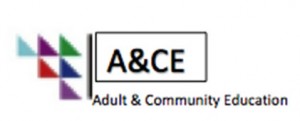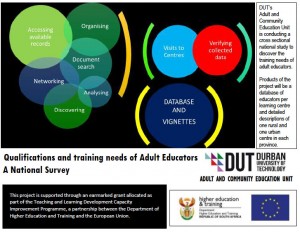
This new unit is based at DUT’s Pietermaritzburg campus – Indumiso at Imbali.
A&CE
In March 2015, DUT appointed two senior researchers / lecturers, Dr Sandra Land and Dr Tabitha Mukeredzi) as the first move towards establishing an Adult and Community Education (A&CE) unit on its Imbali Campus in Pietermaritzburg. They were joined in 2016 by Professor Julia Preece.
The vision of DUT in establishing its A&CE unit is to enhance the provision of adult education for ordinary people living in Pietermaritzburg and in KwaZulu-Natal. This is in concord with the White Paper for Post-School Education and Training, which stresses the need to “to cater to the needs of the millions of adults and youth who are unemployed, poorly educated and not studying” (DHET, 2013, p. 20).
Thus the main objectives in establishing this A&CE unit were:
- to offer formal courses to adult educators and trainers in the public and private sector, thus addressing a long standing gap in education and training opportunities open to adult educators in KZN;
- to run non-formal adult education courses in response to expressed community needs;
- to engage in and provide a base for research and debate in reading, literacy, adult education and community engagement;
- to establish, maintain and promote cooperative working relationships with NGOs, the private sector and government departments in Pietermaritzburg, and with UKZN;
- to support the proposed Pietermaritzburg Community College in offering a range of formal and non-formal adult basic education courses in line with international standards and best practices in order to redress past disadvantage;
- to build this unit to become a recognised Southern African centre of specialisation in literacy, and adult and community education.
 |
 |
Final invitation to apply ADV DIP ACETT
Formal qualifications on offer for 2020
Qualifications that the unit currently offers are:
NQSF level 7:
Advanced Diploma in Adult and Community Education and Training Teaching
NQSF level 8:
Post Graduate Diploma in Adult and Community Education
NQSF level 9:
Master of Education in Adult and Community Education
The unit also has developed documentation for, and hopes to offer:
NQSF level 10:
PhD in Adult and Community Education
In the future we would also like to offer one undergraduate qualification, the Certificate in Adult and Community Education (NQSF level 5)
Non-formal adult and community education
Contracted training
From 2018 we will consider requests for particular adult education or training. We can tailor courses to suit the particular needs of any organisation who seeks to contract us.
Possibilities include but are not limited to:
Competence in a range of computer programmes
Record keeping
Report writing
Assessment and evaluation
Facilitation skills
Basic booking
Emailing and internet skills
Community Education
From 2018 we will offer short courses to members of the community at no cost, if a sponsor is found, or at as low a cost as possible.
Possibilities include but are not limited to
Using cell phones
Cell phone banking
Emailing and internet skills
Helping children with homework
Local government
Health
Education for democracy
Parenting
Sustainable livelihoods
Managing your money
Environmental awareness
Decision making
Local history
Computer literacy
Managing a basic education class
We will respond to requests for training and cooperate with the Community College planned for Mgungundlovu in the delivery of courses
Community engagement
As a self-funding unit, the A&CE unit undertakes community engagement projects.
The Durban based NGO MIET Africa has selected the Adult and Community Unit of DUT as a university based research partner.
Community engagement projects in 2015:
- with MIET Africa: An Action Research Project: Innovative Approaches To Address Barriers To Learning: A Primary Education Intervention for The KZN Department of Education. Based in schools in Edendale, the focus of this project was the implementation of a programme for children experiencing learning problems. The project saw surprising success in using IPads loaded with exercises designed to develop mathematical concepts, as well as in developing teacher’s understanding of how to teach reading.
- with MIET Africa: Education Scan in the Sugarcane growing Areas of KZN and Mpumalanga. Prepared for the Sugar Industry Trust Fund for Education
We do materials development projects and commissioned research (including evaluations of programmes, material, organisations etc) in adult and community education.
Research
Adult and Community Education staff supervise a number of postgraduate students at Masters and Doctoral level. Their research interests are:
Julia Preece: Adult Education, Lifelong Learning, Community Engagement
- After an initial career in community work and adult education in the UK, I have worked in Botswana and Lesotho, arriving in South Africa in 2011. The main focus of my research in recent years has been on adult and lifelong learning in African contexts with a particular interest in the role of university community engagement in improving the lives of communities in urban and rural settings. My recent book publication (University community engagement and lifelong learning: the porous university) explores how community engagement contributes to lifelong learning, with a particular focus on African contexts, in the face of increasing managerialist demands for the commodification of learning. It draws on a theoretical framework of capabilities and asset based community development and the adult learning concept of dialogue to propose a model whereby the university boundaries are metaphorically porous for the surrounding communities. My current, NRF funded, research project is exploring the felt assets and learning needs of selected communities surrounding DUT’s Indumiso campus.
Tabitha Mukeredzi: Adult Education, Teacher Education and Continuing Professional Development, Teacher knowledge and Rural Education
- Having started as a secondary or high school teacher in Zimbabwe, I then worked for a brief stint as Education Adviser and then transferred into a college where among others was training teachers. I later joined a university where again I was coordinating teacher education and other undergraduate and post graduate programmes. This developed in me a passion for teacher education. My PhD was in teacher education and I explored how teachers in rural schools professionally learn and develop. I have published extensively. My initial publications were on teacher development at a distance but in recent years have tended to move away from research related to distance /mixed mode offerings to focus on conventional teacher education, professional development, teacher knowledge, teacher learning and all with an orientation towards rurality. The three book chapters that I have co-authored are all on teacher development. I have drawn on social-constructivist related theoretical frameworks working within the interpretive paradigm and qualitative approaches.
Sandra Land: Adult Education, Literacy – English and IsiZulu
- My research work during the last two decades has been in adult education, with an area of particular specialisation in adult literacy and the development of reading skills in English and isiZulu. My experience has been at opposing ends of the spectrum of reading skills: in adult basic education and the initial acquisition of reading skills on the one hand, and the development and application of academic reading skills on the other. In my PhD I explored the demands made on readers by the orthography of isiZulu, and the strategies naturally adopted by highly competent adult readers of isiZulu. This brought together what I learnt over many years of developing literacy materials in isiZulu, and following international research and trends in how reading should be taught. I feel strongly that the teaching of reading in South Africa could be much improved, especially for learners who are speakers of indigenous languages.
Current research projects
Current research projects include a National Research Foundation (NRF) funded project in partnership with the University of the Free State titled Sustainable Rural Connections.
Project outline:
This proposal asks: how can universities engage with the assets, felt learning needs and connections between urban and rural communities to facilitate sustainable learning ecologies? This is a qualitative study by the University of the Free State (UFS) QwaQwa campus and the Durban University of Technology (DUT) Indumiso campus, using case studies and participatory methodologies. This proposal is contextualised by a growing global interest in the development of learning cities and regions and South Africa’s own National Development Plan and Spatial Development Plan which focus on the development of rural environments and improved services in historically disadvantaged areas. For DUT the proposal is further contextualised by the urban Imbali Education Precinct Draft Development Plan (DHET 2014) which highlights the need to build on local educational networks of institutions and where the DUT campus is positioned to facilitate the development of the Imbali region’s learning complex. For UFS the proposal is contextualised by the region’s rural learning ecologies initiative whereby learning is defined as a constantly evolving ‘activity that takes place within, between and across contexts’ (Hlalele 2014: 564). The Qwaqwa and Indumiso campuses are geographically placed in rural and urban areas respectively but with urban and rural connections. Both universities, therefore, are well positioned to address the under-researched area of urban-rural linkages and the role of higher education institutions in contributing to learning precincts or learning ecologies. The paucity of learning cities/learning region initiatives on the African continent adds further impetus to this study (Biao et al 2013). The study will use asset based community development theory and a capabilities approach as its analytical lens.
The project will run from January 2017 until July 2018.
Publications


